New blog address
The Climate and Environment at Imperial blog has moved. Visit our new blog.
The Climate and Environment at Imperial blog has moved. Visit our new blog.
Grantham Institute Co-Director Professor Joanna Haigh discusses a recent paper which argues that existing climate models ‘run hot’ and overstate the extent of manmade climate change.
 It is perplexing that some climate change sceptics, who expend much energy in decrying global circulation (computer) models of the climate, on the basis that they cannot properly represent the entire complexities of the climate system and/or that they contain too many approximations, are now resorting to an extremely simplified model to support their arguments.
It is perplexing that some climate change sceptics, who expend much energy in decrying global circulation (computer) models of the climate, on the basis that they cannot properly represent the entire complexities of the climate system and/or that they contain too many approximations, are now resorting to an extremely simplified model to support their arguments.
The model used in the Sci. Bull. article is a very useful tool for conceptualising the factors which contribute to the relationship between increasing concentrations of carbon dioxide in the atmosphere and global average temperature – indeed, we use such models as teaching aids for students studying atmospheric physics – but it is in no way fit for purpose as an accurate predictor of climate change. It requires as input the values of a number of parameters and, fundamentally, the choice of these values determines the predicted temperatures
Key here is the “feedback parameter” which represents the knock-on effects of changes in the atmosphere on the initial response to greenhouse gas warming. A positive feedback will make the temperature change larger and a negative one reduce it. For example, as the atmosphere warms it can hold more water vapour which itself is a greenhouse gas, acting to enhance the initial carbon dioxide-induced warming and thus giving a positive feedback. The physics of this process is very well-understood. There are a number of other, both positive and negative, feedback processes but overall, analyses of meteorological observations, modelling and understanding of the physical processes point to a significantly positive value. In the present paper the authors choose a very small value, based on temperatures measured in ice cores over the 810,000 year period of ice ages and inter-glacials. Their analysis is incomplete but anyway not relevant to changes in global climate over decadal-to-century timescales.
Thus by choosing an inappropriate value of the feedback parameter, and also judicious choices of other parameters, the authors end up with their “models run hot” conclusion. Must try harder.
By Professor Colin Prentice, AXA Chair in Biosphere and Climate Impacts
Further to previous posts on this blog regarding Owen Paterson’s recent speech to the Global Warming Policy Foundation, I would like to take this opportunity to correct his dismissive statement about biomass energy as a potential contribution to decarbonized energy production in the UK. This is what the former Environment Secretary said:

“Biomass is not zero carbon. It generates more CO2 per unit of energy even than coal. Even DECC admits that importing wood pellets from North America to turn into hugely expensive electricity here makes no sense if only because a good proportion of those pellets are coming from whole trees.
The fact that trees can regrow is of little relevance: they take decades to replace the carbon released in their combustion, and then they are supposed to be cut down again. If you want to fix carbon by planting trees, then plant trees! Don’t cut them down as well. We are spending ten times as much to cut down North American forests as we are to stop the cutting down of tropical forests.
Meanwhile, more than 90 percent of the renewable heat incentive (RHI) funds are going to biomass. That is to say, we are paying people to stop using gas and burn wood instead. Wood produces twice as much carbon dioxide than gas.”
There are two misconceptions here.
(1) It is extremely relevant that ‘trees can regrow’ – this is the whole reason why biomass energy is commonly accounted as being carbon neutral! To be genuinely carbon neutral, of course, every tonne of biomass that is burnt (plus any additional greenhouse gas emissions associated with its production and delivery to the point of use) has to replaced by a tonne of new biomass that is growing somewhere else. This is possible so long as the biomass is obtained from a sustainable rotation system – that is, a system in which the rate of harvest is at least equalled by the rate of regrowth, when averaged over the whole supply region.
Now it has been pointed out several times in the literature (e.g. Searchinger et al., 2009; Haberl et al., 2012) that if biomass is burnt for energy and not replenished (for example, if trees are cut down and the land is then converted to other uses), then it is not carbon neutral. Indeed, the carbon intensity of this form of energy production is at least as high as that of coal. Paterson may have been influenced by a report on this topic (RSPB, Friends of the Earth and Greenpeace, 2012) which drew attention to the “accounting error” by which energy derived from biomass might be classed as carbon neutral while actually being highly polluting. But this refers to an extreme scenario, whereby increased demand for forest products leads to no increase in the area covered by forests. In this scenario, biomass energy demand would have to be met from the existing (global) forest estate, drawing down the carbon stocks of forests and forcing builders to substitute concrete and other materials for wood. This would certainly be undesirable from the point of view of the land carbon balance; and carbon accounting rules should recognize the fact.
Nonethless, this extreme scenario is implausible. It assumes that the value of biomass as fuel would be comparable to that of timber (highly unlikely) and more generally that there would be no supply response to increased demand. In more economically plausible scenarios, the increased demand for biomass fuel is met by an increase in the use of by-products of timber production (which today are commonly left to decay or burnt without producing any energy), and by an increase in the amount of agriculturally marginal land under biomass production – including non-tree energy crops such as Miscanthus, as well as trees.
Paterson’s blanket dismissal of the potential for biomass production to reduce CO2 emissions is therefore not scientifically defensible. Sustainable biomass energy production is entirely possible, already providing (for example) nearly a third of Sweden’s electricity today. It could represent an important contribution to decarbonized energy production in the UK and elsewhere.
(2) It might seem to be common sense that planting trees (and never cutting them down) would bring greater benefits in extracting CO2 from the atmosphere than planting trees for harvest and combustion. All the same, it is wrong. The point is that just planting trees produces no energy, whereas planting trees for biomass energy production provides a substitute for the use of fossil fuels. There is an enormous difference. Indeed, it has been known for a long time that the total reduction in atmospheric CO2 concentration that could be achieved under an absurdly optimistic scenario (converting all the land that people have ever deforested back into forests) would reduce atmospheric CO2 concentration by a trivial amount, relative to projected increases due to burning fossil fuel (House et al., 2002; Mackey et al. 2013).
I thank Jeremy Woods (Imperial College) and Jonathan Scurlock (National Farmers Union) for their helpful advice on this topic, and suggestions to improve the text.
Haberl, H. et al. (2012) Correcting a fundamental error in greenhouse gas accounting related to bioenergy. Energy Policy 45: 18-23.
House, J.I., I.C. Prentice and C. Le Quéré (2002). Maximum impacts of future reforestation or deforestation on atmospheric CO2. Global Change Biology 8: 1047-1052.
Mackey, B. et al. (2013) Untangling the confusion around land carbon science and climate change mitigation policy. Nature Climate Change 3: 552-557.
RSPB, Friends of the Earth and Greenpeace (2012) Dirtier than coal? Why Government plans to subsidise burning trees are bad news for the planet. http://www.rspb.org.uk/Images/biomass_report_tcm9-326672.pdf
Searchinger, T. et al. (2009) Fixing a critical climate accounting error. Science 326: 527-528.
By Dr Flora Whitmarsh, Grantham Institute
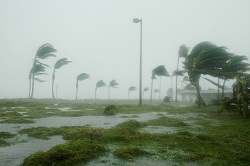 In a lecture to the Global Warming Policy Foundation, the former UK Environment Secretary Owen Paterson has criticised the current government’s climate and energy policies, suggesting there is too much emphasis on renewables and that the consequences of climate change have been exaggerated. A discussion of Mr Paterson’s comments on UK energy policy appears in another Grantham blog by Dr Simon Buckle. Here I will discuss one of the reasons for Paterson’s position, the belief that climate change has been exaggerated.
In a lecture to the Global Warming Policy Foundation, the former UK Environment Secretary Owen Paterson has criticised the current government’s climate and energy policies, suggesting there is too much emphasis on renewables and that the consequences of climate change have been exaggerated. A discussion of Mr Paterson’s comments on UK energy policy appears in another Grantham blog by Dr Simon Buckle. Here I will discuss one of the reasons for Paterson’s position, the belief that climate change has been exaggerated.
Paterson suggested that the Earth has not warmed as much as had been predicted, “ … I also accept the unambiguous failure of the atmosphere to warm anything like as fast as predicted by the vast majority of climate models over the past 35 years, when measured by both satellites and surface thermometers. And indeed the failure of the atmosphere to warm at all over the past 18 years – according to some sources. Many policymakers have still to catch up with the facts.”
If we look back to earlier attempts to quantify global warming, it is now becoming clear that while these attempts were not perfect, they were not hugely inaccurate either. Natural climate variation is more significant than global warming over shorter time periods, but about 25 years have now passed since the earliest attempts to produce policy-relevant projections of rate of warming, and subsequent publications have started to assess how accurate these projections were.
In late 2013, the Intergovernmental Panel on Climate Change (IPCC), a body reporting to the UN, released the first volume of its Fifth Assessment Report. This volume contained an in-depth summary of scientific knowledge about climate science. Scientific understanding of the climate has come a long way since the IPCC released their First Assessment Report in 1990, but the basics of the greenhouse effect were well understood at the time. The projections of future temperature rise in the 1990 report represent the earliest attempt to produce a scientific consensus of opinion regarding the severity of global warming.
A paper published in 2010 by Frame and Stone checked the projections in the First IPCC Report against observed temperature rise. Under the “business as usual” emissions scenario, the IPCC’s best estimate for the projected temperature increase between 1990 and 2010 was 0.55C, within a range of uncertainty. According to two different data sets, temperatures actually increased by 0.35C (HadCRUT3) or 0.39C (GISTEMP) during that period. This is just outside the broader range given by the IPCC, but the IPCC’s range was intended to reflect the uncertainty in the effects of greenhouse gases emissions on the long term warming trend. No attempt was made to include natural climate variability. Frame and Stone performed calculations to account for natural variability using two plausible methods. Both methods showed that the measured temperature increase is consistent with the IPCC’s projections when natural variability is taken into account. In addition, emissions have not been precisely the same as the trajectory used by IPCC, although on this timescale the difference is probably not very significant.
Another early attempt to make policy-relevant projections was published by Hansen et al. in 1988, and results from this work were presented in testimony to the US congress in the same year. Analysis published in 2006 by Hansen et al. demonstrated that the 1988 calculations had been remarkably accurate, with the observed temperatures closely matching those projected under the most realistic emissions scenario. The exceptionally close agreement between the model projections and the observations may have been coincidental since the sensitivity of the climate to carbon dioxide in Hansen’s original model was near the top of the currently accepted range. Nevertheless, the temperature increases projected by the model were close to observations available in 2006.
It is reassuring that these early projections have proved to be of the right magnitude even though the exact rate of warming wasn’t projected. It is worth bearing in mind that the original projections were made about 25 years ago, and the subsequent analysis referenced here was carried out in 2006 and 2010, meaning that only 18-20 years of data is used. This is still not long enough to iron out the full effects of natural variability. Nevertheless, it is now clear that the planet is warming and that humans are responsible, something that could not be concluded unequivocally from the evidence available 25 years ago. It is testament to this overwhelming evidence that those opposed to action on climate change now rely on relatively minor criticisms of climate science to form the basis of their opposition.
Coming to Paterson’s second point, it is indeed true that there has been no significant increase in global surface temperatures in the 21st century so far. However, global warming is not expected to lead to a linear increase in surface temperatures. Indeed, the First Assessment Report of the IPCC, published in 1990, stated that “The [average global surface temperature] rise will not be steady because of the influence of other factors.” Other factors – notably solar cycles, volcanic eruptions and natural climate variation – are known to affect global surface temperatures. The lack of surface temperature increase this century is due to a combination of factors, but almost certainly there has been some contribution from natural changes in the amount of heat taken up by the ocean. It is important to note that the overall heat content of the planet continues to increase and this is still contributing to sea level rise and ice melt.
Paterson continued, “I also note that the forecast effects of climate change have been consistently and widely exaggerated thus far.
“The stopping of the Gulf Stream, the worsening of hurricanes, the retreat of Antarctic sea ice, the increase of malaria, the claim by UNEP that we would see 50m climate refugees before now – these were all predictions that proved wrong.”
There is a hierarchy of uncertainty in climate change prediction. The increase in surface temperatures at a global level due to the greenhouse effect is well understood scientifically. The total amount of heat in the earth system is increasing due to greenhouse gas emissions, which is having the effect of melting ice and snow and warming the ocean, lower atmosphere and Earth surface. All of these impacts, along with ocean acidification from increasing atmospheric carbon dioxide concentrations, are almost certain to continue. Increasing temperatures will also have more complex dynamic effects, including on ocean currents and atmospheric circulation – key aspects of climate variability – as well as on weather patterns, including extreme weather. These impacts are generally harder to predict because there are more factors involved. Putting all of this together and trying to predict the effect of climate change on humans or ecosystems is even more complicated.
The large scale Atlantic Ocean circulation, of which the Gulf Stream forms a part, is driven in part by processes in the North Atlantic that depend on the density of the water in the region. Polar ice melt and changing rainfall patterns due to climate change both have the effect of depositing relatively fresh (and therefore low density) water in the North Atlantic, meaning this process could be affected by climate change. The possibility of a complete shutdown of this North Atlantic circulation has been discussed based on the results of simplified models that show this as a possible outcome. However, mainstream scientific consensus has never been that that this is likely. Again, it is worth going back to older IPCC reports, which form the most comprehensive overview of the scientific understanding of climate change at the time they were written. At the time of the IPCC’s Second Assessment Report in 1995, the available models suggested that the ocean overturning circulation would weaken due to climate change. Subsequent reports in 2001 and 2007 also projected a slowdown and discussed the possibility of a shutdown, but neither report predicted a complete shutdown before 2100. By the time of the latest IPCC report in 2013, the overturning circulation was projected to weaken by between 11% and 34% by 2100. A slowdown has not yet been detected in the observations; this is likely due to the significant natural variability in the strength of the overturning circulation and the limited observational record.
There is more than one way that climate change can affect hurricanes (or tropical cyclones more generally). Heavy rain is almost certainly becoming more frequent and intense globally, and this includes rain that falls during tropical cyclones. In addition there could be an effect on wind speeds or on the frequency of tropical cyclones. The IPCC’s Fifth Assessment Report reported observational evidence that the strongest tropical cyclones in the North Atlantic have become more intense and more frequent since the 1970s, although there is no evidence of a global trend.
There has been a global decline in ice and snow due to climate change. Taking sea ice specifically, Arctic and Antarctic Sea Ice have different characteristics. The Arctic sea ice is more long lived and is declining in both area and mass. Antarctic sea ice is not declining in area because the ice is more mobile than in the Arctic meaning its characteristics are more complex. However since its thickness has not been accurately measured, it is not known whether it has gained or lost mass overall. Sea ice is not to be confused with the Greenland and Antarctic ice sheets, both of which are losing mass. This is discussed in more detail in a previous blog.
Coming back to the hierarchy of uncertainty, changes in malaria incidence and the numbers of potential climate refugees are in the most uncertain group of impacts. These changes depend on the detailed changes in climate in the location under discussion and the response of humans or mosquitos/malarial parasites to that. A change in malaria incidence is still possible, but this remains the subject of research. As well as local climate conditions, the number of climate change refugees would also depend on the response from local people, governments or other organisations in adapting to the effects of climate change. The number of unknowns here makes it very difficult to predict how many people might be displaced by climate change, but this does not undermine our confidence in climate science itself.
By Dr Simon Buckle, Grantham Institute
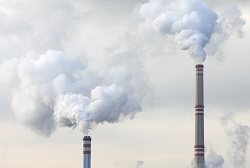 Owen Paterson’s remarks on the UK response to climate change miss the point. I do not disagree with him that the UK decarbonisation strategy should be improved. In particular, there is a need for a more effective strategy on energy demand. However, my preferred policy and technology mix would be very different to his and include the acceleration and expansion of the CCS commercial demonstration programme in order to reduce the energy penalty and overall costs of CCS. And without CCS, there is no way responsibly to use the shale gas he wants the UK to produce in the coming decades for electricity generation or in industrial processes, or any other fossil fuels.
Owen Paterson’s remarks on the UK response to climate change miss the point. I do not disagree with him that the UK decarbonisation strategy should be improved. In particular, there is a need for a more effective strategy on energy demand. However, my preferred policy and technology mix would be very different to his and include the acceleration and expansion of the CCS commercial demonstration programme in order to reduce the energy penalty and overall costs of CCS. And without CCS, there is no way responsibly to use the shale gas he wants the UK to produce in the coming decades for electricity generation or in industrial processes, or any other fossil fuels.
However, these are second order issues compared to his call for scrapping the 2050 targets and the suspension of the UK Climate Change Committee. On current trends, by the end of the century, the surface temperature of our planet is as likely as not to have increased by 4°C relative to pre-industrial conditions. The present pause in the rise of the global mean surface temperature does not mean we do not need to be concerned. We are fundamentally changing the climate system, raising the likelihood of severe, pervasive, and irreversible impacts on society and the natural systems on which we all depend.
A cost-effective policy to limit these very real climate risks must be based on concerted, co-ordinated and broad-based mitigation action. This is needed to deliver a substantial and sustained reduction in global greenhouse gas emissions, which continue on a sharply rising trajectory. The best way to create the conditions for such action by all the major emitting economies – developed and developing, in different measure – is through the UN negotiation process, supplemented by bodies such as (but not confined to) the Major Economies Forum. The focus of this process is now on achieving a deal covering emissions beyond 2020, due to be finalised at the Paris summit at the end of next year.
There are encouraging signs of progress, e.g. in both the US and China, and the EU is due to agree its own 2030 targets at the end of this month. But the process is difficult and protracted. I agree with Paterson that 2050 is not the be all and end all. I have argued here that the Paris talks should focus on how the next climate agreement can help us collectively to achieve a global peak in emissions before 2030, the first necessary step to any stringent mitigation target, rather than trying to negotiate a deal covering the whole period to 2050.
If Paris is a success, we might then re-assess whether or not the UK’s current mitigation targets are adequate or not. But we are rapidly running out of time to achieve what the world’s governments profess to be their aim of limiting global warming to at most 2 degrees Celsius above pre-industrial levels. The longer we delay mitigation action, the more difficult that challenge will be and the more expensive. At some point soon it will become impossible in practical terms.
Given its leadership on this issue over many decades, UK action to scrap the Climate Change Act and/or suspend or abolish the Climate Change Committee would be severely damaging. Seeking short-term domestic political advantage – which is what this move appears to be – through recommendations that would undermine national, European and international efforts to limit climate risks is irresponsible. Sadly, this seems to be what the so-called political “debate” in the UK has been reduced to.
The Climate and Environment at Imperial blog has moved. View this post on our new blog
By Dr Flora Whitmarsh, Grantham Institute
The recent slowdown in global temperature rise has led to suggestions that global warming has stopped. In fact, the Earth system is still gaining heat, and the slowdown was likely caused by a series of small volcanic eruptions, a downward trend in the solar cycle, and increased heat uptake of the ocean. Writing in the Telegraph, Christopher Booker claims that a new paper by Professor Carl Wunsch (Wunsch, 2014) shows that ocean warming cannot explain the slowdown because the deeper ocean is in fact cooling rather than warming. Booker is incorrect in his interpretation of the paper, as Professor Wunsch explained in a letter of response to the Telegraph editor that was not published. Wunsch also wrote a letter to the editor of The Australian following a similarly misleading article in that newspaper. There are two threads to Christopher Booker’s argument in the Telegraph article. First, he suggests that the new paper refutes the idea that the pause is caused by an increase in ocean heat uptake, an interpretation that is untrue. Second, Booker gives a misleading interpretation of Wunsch’s appearance on the 2007 television documentary The Great Global warming Swindle in which Wunsch’s views were misrepresented by the documentary makers. Below, I describe the significance of ocean heat uptake and then discuss Booker’s two points in turn.
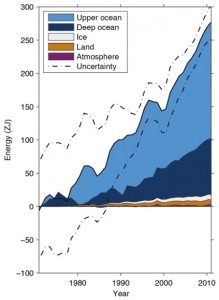
The ocean is an important heat sink and has taken up over 90% of the extra heat absorbed by the Earth system over the last century. There is natural variation in the amount of heat being taken up by the ocean. This is part of the reason why the observed increase in surface temperatures has not been uniform in the past. All studies including this latest one agree that the ocean above 2000 m is absorbing a significant amount of heat and this is the main focus of studies trying to detect and attribute global warming. The study of the ocean below 2000m is interesting from a scientific point of view but is less relevant to the study of climate change because it takes a very long time for heat to mix to these lower layers. Heat is transferred to the deep ocean by the movement of water masses – the mixing driven by the small-scale movement of water molecules is too slow to be of much significance. Due to the locations of the major ocean currents, parts of the deep ocean such as the western Atlantic and the Southern Ocean in the Antarctic have been in contact with the surface relatively recently, meaning they would be expected to have warmed due to global warming. By contrast, much of the Pacific Ocean below 1500 m has not been in contact with the surface for around a thousand years – something that has been demonstrated by studying the radioactive decay of carbon-14 atoms in a technique similar to the carbon dating of objects (Matsumoto, 2007 – see figure 2).
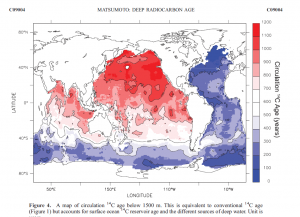
Christopher Booker writes, “Prof Carl Wunsch … has produced a paper suggesting not only that the warmists have no real evidence to support their claim other than computer modelling, but that the deeper levels of the oceans have, if anything, not been warming but cooling recently, thanks to climate changes dating back centuries.”
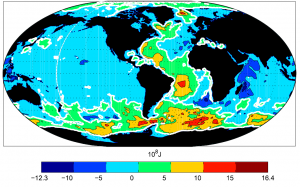
In the paper under discussion, Bidecadal Thermal Changes in the Abyssal Ocean, Wunsch looks at observations of ocean heat content. He found that the ocean as a whole and the top 700 m had gained heat since 1993, but that there had been an overall decline in heat content below 2000 m according to the available data. There has been a warming in the regions of the deep ocean below 2000 m where it would be expected due to the transport of water from the surface to the abyss by major ocean currents, i.e. the western Atlantic Ocean and the Southern Ocean (see figure 3). There was an observed cooling below 2000 m in other parts of the ocean including most of the Pacific. Much of the deep Pacific Ocean would not be expected to have warmed due to climate change because the water has not been in recent contact with the surface (figure 2). The available observations are very sparse and only about a third of the water below 2000 m was sampled at all during the period under discussion, meaning it is not known whether these results reflect a genuine cooling below 2000 m. Because there was heating in some places and cooling in others, it is particularly hard to accurately determine the mean from very sparse observations. The main conclusion of Wunsch, 2014 was in fact that more observations are needed to improve our understanding of processes involved in transporting water to the deep ocean. This is a subject which has received relatively little attention, with much more research effort being concentrated on the upper ocean. It is likely that this is partially due to the difficulty involved in observing the ocean at depth, and partly because the upper ocean is of interest due to its direct impact on weather patterns, for example through its role in the formation of El Niño and La Niña conditions. None of this changes the fact that the Earth system as whole is gaining heat, and that a significant proportion of that heat is being taken up by the ocean, mostly in the top 700 m. The paper doesn’t significantly change our understanding of the pause in surface temperature rise. We know that natural processes do change the amount of heat taken up by the ocean over time, and that surface temperature rise has not been uniform in the past. However, precisely quantifying how much heat has been taken up by the deep ocean is still not possible with current observations.
Referring to the 2007 television documentary, The Great Global Warming Swindle, Booker suggested that Wunsch had privately held “sceptic” views at the time the programme was aired, but didn’t feel able to express these views in public, “So anxious is the professor not to be seen as a “climate sceptic” that, [after being interviewed for] The Great Global Warming Swindle, he complained to Ofcom that, although he had said all those things he was shown as saying, he hadn’t been told that the programme would be dedicated to explaining the scientific case against global warming.” Professor Wunsch’s views on The Great Global Warming Swindle are explained at length on his professional webpage in an article dated March 2007. I will not paraphrase his comments in detail, but suffice it to say he states his belief that “climate change is real, a major threat, and almost surely has a major human-induced component”, and wrote to the documentary makers to say, “I am the one who was swindled” because they misrepresented his views by quoting him out of context. In an update written three months later, Wunsch made it clear that he did not complain to Ofcom under duress from other scientists. In fact, he felt so strongly that his opinions had been misrepresented that he filed his complaint despite threats by the documentary maker to sue him for libel. References Matsumoto, K. (2007), Radiocarbon-based circulation age of the world oceans, J. Geophys. Res., 112, C09004. Wunsch, 2014: Carl Wunsch and Patrick Heimbach, 2014: Bidecadal Thermal Changes in the Abyssal Ocean. J. Phys. Oceanogr., 44, 2013–2030.
A recent paper on ocean warming has been reported on in a number of newspaper articles, most recently by Christopher Booker in the Sunday Telegraph.
The author of the paper, Professor Carl Wunsch of MIT, wrote a letter to the editor of the Sunday Telegraph in response to Christopher Booker’s article. As the letter has yet to be published in the Sunday Telegraph, with the permission of Professor Wunsch we have decided to post it here.
Dear Editor,
In the Sunday Telegraph of 27 July 2014, Christopher Booker pretends to understand a highly technical paper on ocean warming to such a degree that he can explain it to his lay-audience. Had he made the slightest effort to contact me, I could have told him that the paper in reality says that the ocean is warming overall at a rate consistent with previous values – but that parts of the deepest ocean appear to be cooling. This inference is not a contradiction to overall warming. He imputes to me a wish to hide my views: nothing could be further from the truth. I believe that global warming is an extremely serious threat, but how that threat will play out in detail is scientifically still poorly understood. Anyone who interprets the complexity of change to mean global warming is not occurring and is not worrying, is ignorant enough to regard The Great Global Warming Swindle as a documentary – it is an egregious propaganda piece.
Carl Wunsch
Harvard University and Massachusetts Institute of Technology
by Dr Flora Whitmarsh, Grantham Institute
 In an article for the Telegraph, Christopher Booker gave his views on Professor Sir Brian Hoskins’ appearance on the Today programme earlier this year. In the article, Booker made several claims about climate science relating to rainfall, atmospheric humidity, polar sea ice extent, global temperatures and sea level rise. In this blog I will assess his claims against the findings of the latest report of Working Group 1 of the Intergovernmental Panel on Climate Change (IPCC), a hugely comprehensive assessment of the scientific literature.
In an article for the Telegraph, Christopher Booker gave his views on Professor Sir Brian Hoskins’ appearance on the Today programme earlier this year. In the article, Booker made several claims about climate science relating to rainfall, atmospheric humidity, polar sea ice extent, global temperatures and sea level rise. In this blog I will assess his claims against the findings of the latest report of Working Group 1 of the Intergovernmental Panel on Climate Change (IPCC), a hugely comprehensive assessment of the scientific literature.
Booker’s comment: “Not even the latest technical report from the UN’s Intergovernmental Panel on Climate Change (IPCC) could find any evidence that rainfall and floods were increasing.”
Scientific Evidence:
The IPCC report found a significant climate influence on global scale changes in precipitation patterns (with medium confidence), including increases in precipitation in northern hemisphere mid to high latitudes. Further evidence of this comes from the observed changes in sea level salinity, an indication of the global distribution of evaporation and precipitation. The data is currently too inconclusive to report other regional changes in rainfall with confidence. Overall, however, there had been little change in land-based precipitation since 1900, contrasting with their 2007 assessment, which reported that global precipitation averaged over land areas had increased.
The IPCC concluded that there continues to be a lack of evidence and thus low confidence regarding the sign of trend in the magnitude and/or frequency of floods on a global scale.
The IPCC’s projected short-term changes (2016-35) in rainfall were:
There is also likely to be an increase in the frequency and intensity of heavy precipitation events over land. Regional changes will be strongly affected by natural variability and will also depend on future aerosol level (emissions and volcanic) and land use change.
Global rainfall totals are expected to go up in the longer term (i.e. beyond 2035) by around 1-3% per degree Celsius of global mean surface temperature increase, except in the very lowest emissions scenario.
Booker is partially right on past changes: the IPCC found no significant trend in global average rainfall over land. But this is not to say there has been no effect. Indeed, the expected increase in extreme heavy rain is already happening: the IPCC concluded with medium confidence that since 1951 there has been an increase in the number of heavy precipitation events in more regions than have had a decrease.
Read more about the impacts of climate change on UK weather
Booker’s comment: “From the official National Oceanic and Atmospheric Administration (NOAA) satellite data on humidity (shown on the “atmosphere page” of the science blog Watts Up With That), we see it has actually been falling.”
Scientific Evidence:
The key measure of whether atmospheric humidity is rising or falling is specific humidity, i.e. the mass of water vapour in a unit mass of moist air. The “atmosphere page” of “Watts Up With That” when accessed on 17 July wrongly shows data on relative humidity under the heading “Specific humidity”. Relative humidity is a measure that depends on temperature and does not therefore measure the absolute water vapour content of the atmosphere. In other words, Booker’s evidence is not evidence.
The latest IPCC report concludes that it is very likely that global near surface and tropospheric air specific humidity have increased since the 1970s. However, during recent years the near-surface moistening trend over land has abated (medium confidence). The magnitude of the observed global change in water vapour of about 3.5% in the past 40 years is consistent with the observed temperature change of about 0.5°C during the same period. The water vapour change can be attributed to human influence with medium confidence.
Booker’s comment: “As for polar ice, put the Arctic and the Antarctic together and there has lately been more sea ice than at any time since records began (see the Cryosphere Today website).”
Scientific Evidence:
The IPCC found that since 1979, annual Arctic sea ice extent has declined by 0.45-0.51 million km2 per decade and annual Antarctic sea ice extent has increased by 0.13-0.20 million km2 per decade. Taking the two IPCC estimates together, it can be inferred that total global sea ice extent has declined since 1979.
Sea ice thickness is harder to measure. The IPCC combined submarine-based measurements with satellite altimetry, concluding that Arctic sea ice has thinned by 1.3 – 2.3 m between 1980 and 2008. There is insufficient data to estimate any change in Antarctic sea ice thickness.
The reason why the Arctic sea ice has declined and the Antarctic sea ice hasn’t is because they have very different characteristics. Arctic sea ice is constrained by the North American and Eurasian landmasses to the south. In the central Arctic Ocean, the ice can survive several years, which allows it to thicken to several meters. Due to climate warming, the Arctic summer minimum has declined by around 11.5% per decade since 1979, and the extent of the ice that has survived more than two summers has declined by around 13.5% per decade over the same period. This has serious consequences for the surface albedo (reflectance) of the Arctic, as a reduction in the highly reflecting sea ice with less reflective open water results in enhanced absorption of solar radiation.
In contrast to the Arctic, Antarctic sea ice forms in the open ocean with no northern land to constrain its formation. The vast majority of Antarctic sea ice melts each summer.
Booker mentioned sea ice specifically, but he did not mention the other important components of the global cryosphere. Making use of better observations than were available at the time of their previous report in 2007, the IPCC carried out an assessment of all the ice on the planet and concluded that there had been a continued decline in the total amount of ice on the planet. The Greenland and Antarctic ice sheets are both losing mass (with very high confidence and high confidence respectively). Glaciers are known to be declining globally (with very high confidence). Overall snow cover, freshwater ice and frozen ground (permafrost) are also declining, although the available data is mostly for the Northern hemisphere.
Booker says: “As for Sir Brian’s claim that by 2100 temperatures will have risen by a further ‘3-5oC’, not even the IPCC dares predict anything so scary.”
Scientific evidence:
Future temperature rise of course depends on greenhouse gas emissions. In the lowest of the IPCC emissions scenarios, which assumes that global carbon dioxide emissions will decline after 2020, reach zero around 2080, and then continue dropping to just below zero by 2090, temperatures are projected to increase by another 0.3oC – 1.7oC by 2100. Total warming under this scenario is projected to be 0.9oC – 2.3oC relative to 1850-1900, i.e. including warming over the 20th century. Under the highest emissions scenario, the closest to business as usual, another 2.6oC – 4.8oC of warming is projected by 2100. In this case, the total projected temperature rise by 2100 is 3.2oC – 5.4oC when past temperature rise is included.
It is worth emphasising that if emissions are not constrained then we are likely to see a temperature rise of the same order as the projections under the IPCC’s highest emissions scenario. All three of the other scenarios assume that carbon dioxide emissions will peak and then decline substantially at some point in the coming decades. If emissions continue to rise then we should expect a total temperature increase in the region of 3.2oC – 5.4oC by the end of the century. This can of course be avoided if action is taken to reduce fossil fuel dependency.
Booker says: “[Professor Hoskins] was never more wobbly than when trying to explain away why there has now been no rise in average global temperatures for 17 years, making nonsense of all those earlier IPCC computer projections that temperatures should by now be rising at 0.3C every decade.”
Scientific evidence:
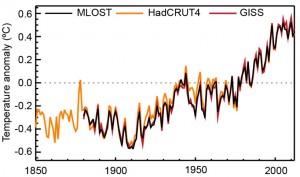
Climate change is a long term trend, and a few decades worth of data are needed to separate the warming trend from natural variability. Global mean surface temperature increased by about 0.85oC over the period 1880-2012. Each of the last three decades has been warmer than all previous decades in the instrumental record and the decade of the 2000s has been the warmest.
The observed temperature record over the 20th Century shows periods of slower and faster warming in response to a number of factors, most notably natural variability in the climate system, the changes in atmospheric composition due to large-scale human emissions of greenhouse gases and aerosols from burning fossil fuels and land-use change, volcanic activity and small changes in the level of solar activity.
In future, there will continue to be natural variation in temperature as well as a long term warming trend due to our greenhouse gas emissions. Significant natural climate variability means that a prolonged continuation of the current slowdown in the rate of increase would not on its own be strong evidence against climate change, provided that: 1) the global mean sea level continued to rise due to thermal expansion of the oceans, the melting of glaciers and loss of ice from ice sheets, and 2) the measured net energy flow into the climate system (predominantly the ocean) remained significantly positive.
The climate models used by the IPCC are not designed to predict the exact temperature of the Earth surface in a particular year or decade. This would require scientists to predict the future state of climatic phenomena such as the El Niño Southern Oscillation or the Pacific Decadal Oscillation for a specific period several years in advance, something that is not currently possible. Volcanic eruptions also have an impact on global temperatures, and they are not known about far enough in advance to be incorporated into the IPCC’s model projections.
Read more in our Grantham Note on the slowdown in global mean surface temperature rise
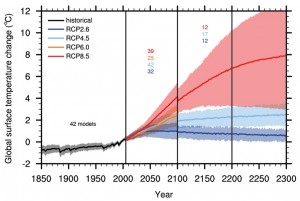
Booker says: “NOAA’s data show that the modest 200-year-long rise in sea levels has slowed to such an extent that, if its recent trend continues, by the end of the century the sea will have risen by less than seven inches.”
Scientific evidence:
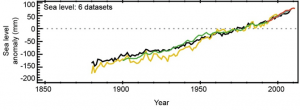
The IPCC assessed the relevant data carefully and concluded that sea level rose by around 19 cm (about 7 ½ inches) between 1901 and 2010. This is based on tide gauge data, with satellite data included after 1993. The rate of sea level rise was around 3.2 mm (about 1/8th inch) per year between 1993 and 2010. This is faster than the overall rate since 1901, indicating that sea level rise is accelerating as would be expected from thermal expansion of seawater and increased melting of ice on land.
Future sea level projections under the highest IPCC emissions scenario tell us what is likely to happen if emissions continue to rise unabated. In this case, sea level is projected to increase by a further 63 cm (about 24 ¾ inches) in the last two decades of this century compared with the 1986-2005 average. Even in the lowest emissions scenario, which requires substantial emissions reductions, another 40 cm (about 15 ¾ inches) of sea level rise can be expected by 2100.
Read more in our Grantham Note on sea level rise.
Reference for figures:
IPCC, 2013: Climate Change 2013: The Physical Science Basis. Contribution of Working Group I to the Fifth Assessment Report of the Intergovernmental Panel on Climate Change [Stocker, T.F., D. Qin, G.-K. Plattner, M. Tignor, S.K. Allen, J. Boschung, A. Nauels, Y. Xia, V. Bex and P.M. Midgley (eds.)]. Cambridge University Press, Cambridge, United Kingdom and New York, NY, USA, 1535 pp.
By Dr Simon Buckle, Grantham Institute
Professor Lennart Bengtsson’s resignation from the GWPF (Global Warming Policy Foundation) Academic Advisory Council has received wide coverage and raises important issues.
Whatever anyone’s views are on the role, motivation and integrity of the GWPF in this matter, it is up to individual academics whether or not to associate themselves with it in an advisory role.
It is regrettable that perceived political stances on the climate issue are apparently so affecting academic activity. The Grantham Institute at Imperial has always opposed such behaviour, believing that scientific progress requires an open society. We try to engage with a wide range of figures, some with radically different views on climate change.
The outcome in this case is probably a reflection of the “us and them” that has permeated the climate science debate for decades and which is in part an outcome of – and reaction to – external pressure on the climate community. But we must be clear: this is not a justification. Concerted external pressure – if that is what it was – on Professor Bengtsson to resign from his GWPF role was wrong and misjudged.
Academic work on climate science and responses to climate variability and change should be politically neutral. Policy towards climate is inevitably value-based and hence political. We need the insights from high quality research and analysis to ensure our policy and political choices are as well informed as can be – importantly including social, political and economic research as well as that from the physical sciences and engineering.
What we learn from this event is that maintaining a healthy separation between science and politics – on either side of the political debate – is a continual but necessary challenge. We have to keep the scientific endeavour as free as possible from political contention over policy responses. All serious scientific voices on climate change therefore deserve both respect and to be heard. But given the enormity of the issues, these views require rigorous scrutiny and testing.
This episode should not distract us from the fact that we are performing a very dangerous experiment with the Earth’s climate. Even by the end of this century, on current trends we risk changes of a magnitude that are unprecedented in the last 10,000 years. How we respond to that is a matter of public policy, on which of course scientists have both a voice and often strong opinions, but as citizens not as policy experts.
BBC’s Question Time on 14 November saw Lord Lawson citing the IPCC findings to support one of his arguments. Did I dream that? Then I realised that, of course, the reference to the IPCC was incomplete and misleading so I knew I was awake and back in the strange media-distorted world of the UK debate on climate change.
According to the Daily Express, Lord Lawson said that “If you look at the inter-governmental panel on climate change they say there is absolutely no connection between climate change and tropical storms.” Wrong, but convenient for someone who argues we probably don’t need to do anything much about climate change.
What the IPCC actually said in the admirably cautious Technical Summary of the Fifth Assessment Report (AR5) was that:
“Globally, there is low confidence in attribution of changes in tropical cyclone activity to human influence. This is due to insufficient observational evidence, lack of physical understanding of the links between anthropogenic drivers of climate and tropical cyclone activity, and the low level of agreement between studies as to the relative importance of internal variability, and anthropogenic and natural forcings.”
So far so good for Lord Lawson, but then, the IPCC goes on to say:
“Projections for the 21st century indicate that it is likely that the global frequency of tropical cyclones will either decrease or remain essentially unchanged, concurrent with a likely increase in both global mean tropical cyclone maximum wind speed and rain rates (Figure TS.26). The influence of future climate change on tropical cyclones is likely to vary by region, but there is low confidence in region-specific projections. The frequency of the most intense storms will more likely than not increase substantially in some basins. More extreme precipitation near the centers of tropical cyclones making landfall are likely in North and Central America, East Africa, West, East, South and Southeast Asia as well as in Australia and many Pacific islands.” (my emphasis).
In making this statement, the IPCC reflects the fact that, while the science is by no means settled, there are a number of studies that provide physical mechanisms linked to climate change that suggest the frequency of the most intense storms would increase with warming. As I understand it, the warmth of the near surface ocean provides the basic fuel for the cyclone: the winds spiralling around the system evaporate water which cools the ocean and puts latent heat into the atmosphere. When the air rises and the water condenses in deep convection in the storm the heating leads to extra ascent, drawing in more air and leading to faster surface winds. The warmer the ocean is, the more fuel there is for a potential tropical cyclone, and the stronger they could be. Many other aspects come into play such as the changing winds with height and the temperature of the atmosphere up to 15 km. However, in a warmer world, the potential for stronger storms is there.
Indeed, based on this sort of evidence, the quote highlighted above is a statement that the IPCC judges there is more than a 50% chance that the frequency of the most intense storms will increase substantially in some ocean basins. So if Typhoon Haiyan was not affected by climate change and yet was still one of the most powerful storms ever making landfall, it’s clear that the Philippines and other regions exposed to tropical cyclones have a lot to worry about unless we make a “substantial and sustained reductions of greenhouse gas emissions (SPM Section E).” It would be good to see Lord Lawson quoting that particular part of the IPCC AR5 report!
It may help to clarify some of the facts related to the lively exchange between Bob Ward and Lord Ridley about the Transient Climate Response (TCR). The TCR is defined by the IPCC as “the change in the global mean surface temperature, averaged over a 20-year period, centred at the time of atmospheric carbon dioxide doubling, in a climate model simulation in which CO2 increases at 1% yr – 1.”
Lord Ridley is right that the IPCC in its recently published AR5 Working Group I report gave an estimated likely (66–100% probability) range for TCR of 1 – 2.5°C. The IPCC also increased its confidence that the TCR is not greater than 3.0°C though it is not immediately clear what confidence the IPCC places on the 1°C lower limit, rather than the range it provides.
As Bob Ward notes, however, the TCR is unlikely to reflect how global mean surface temperatures might increase during this century, as claimed by Lord Ridley. This is for two reasons. First, our carbon dioxide emissions are rising by around three percent not one percent per year. Second, the TCR only refers to changes due to carbon dioxide; climate change will be greater than this due to increases in other greenhouse gases such as methane and nitrous oxide, though it is also offset to some degree by atmospheric aerosols.
Our current emissions are broadly in line with the most emissions intensive of the IPCC’s scenarios for AR5 – the so-called RCP8.5 scenario. This is likely to lead to an average increase in global mean surface temperature for the final two decades of this century of 3.2-5.4°C relative to the second half of the nineteenth century. This is a huge change and will be even larger in high latitudes and over continents. The scale of change is broadly comparable to that which separates our present climate from that of the Ice Age.
I don’t think we have any clear idea of what the full economic, social and political impact of such huge changes would be. I am all in favour of policies that lift people out of poverty, insecurity and hunger now. But that does not mean we should ignore the huge risks we are taking with the climate to which humans have become adapted. Presenting this as a sharp dichotomy is wrong.